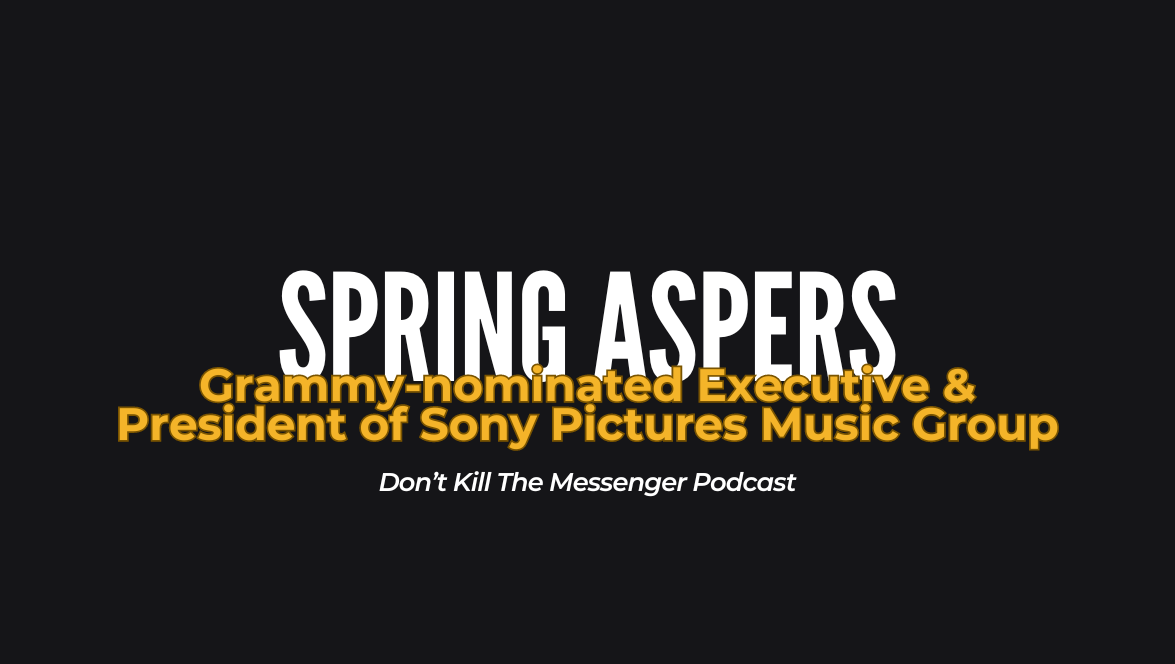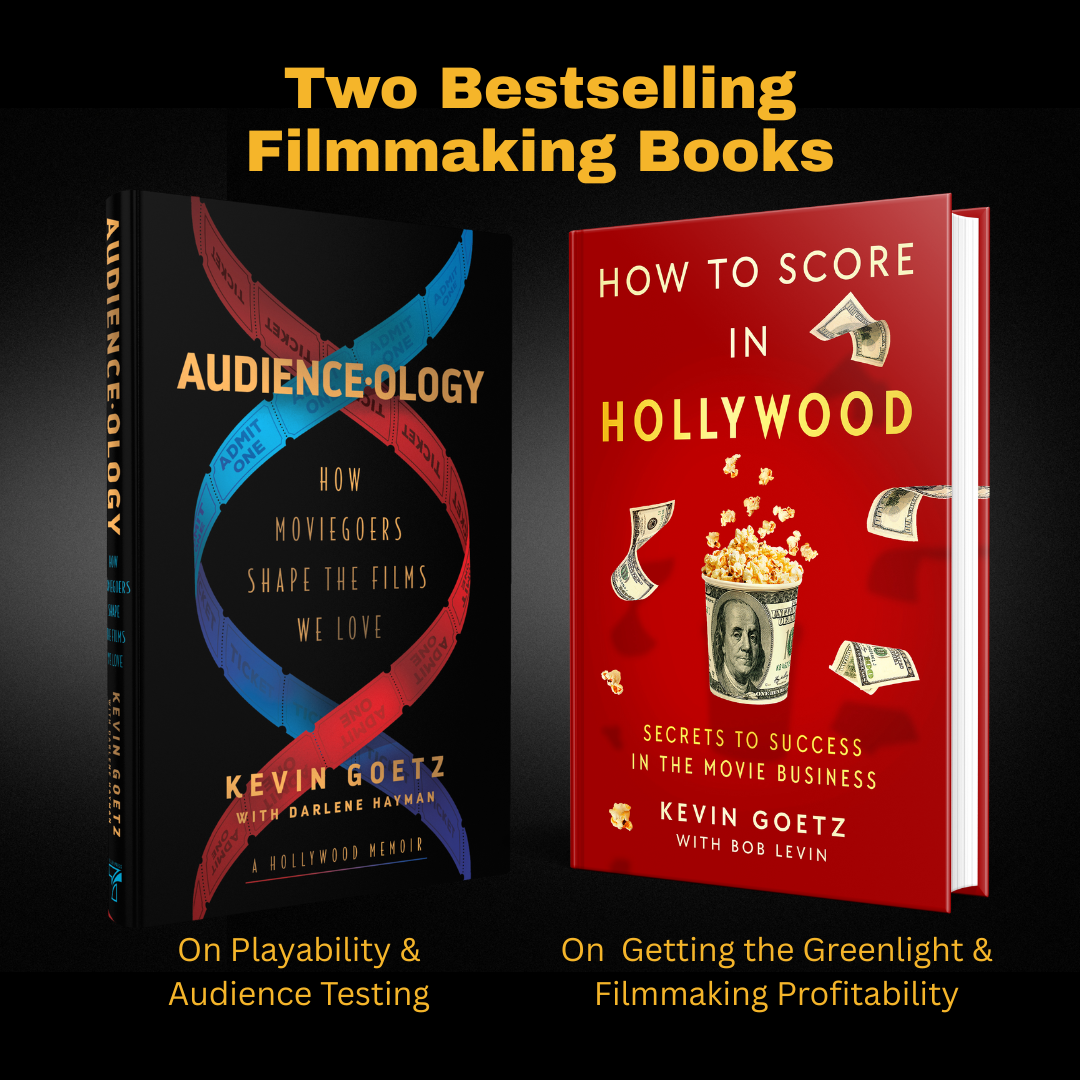
Don’t Kill the Messenger welcomes Grammy-nominated executive and President of Sony Music Group, Spring Aspers
In this episode of “Don’t Kill the Messenger,” host Kevin Goetz sits down with Spring Aspers, the Grammy-nominated President of Sony Pictures Music Group. With a career spanning from intern to President, Spring has become a powerhouse in the film music industry. Her work on blockbuster soundtracks like Spider-Man: Into the Spider-Verse has earned her critical acclaim and a Grammy nod. As the executive behind numerous hit movie soundtracks and a champion for emerging artists, Spring shares her process for choosing music for a film’s soundtrack, and discusses the details of music supervision in film.
Kevin Goetz on Music in Film:
Music is vital in a movie — enhancing emotions, setting the tone, and aiding storytelling. It deepens viewer engagement by amplifying the impact of scenes and seamlessly transitioning between moments, shaping the overall film experience. It truly can make or break a movie.
Spring Aspers on Music in Film:
Having a feeling and an instinct and getting to realize it. Saying to somebody, I’ve heard this song, this is really good. I feel it, it fits it. And people go, yeah, I hear it. And then the world hears it. And there is nothing more addictive than making a movie that globally people love. It is the most a addicting thing, and it is very powerful.
From Bohemian Roots to Music Executive
Spring’s unconventional upbringing in New York’s art scene shaped her passion for music. She recalls, “I grew up in this arena of creativity around a lot of music, painting, art. All of it was just uniformly together in the environment.”
The Art of Musical Matchmaking
Spring describes herself as a “musical matchmaker,” always seeking to find the right sound that resonates with the heart of a story. She explains her process:
“I really just stay a fan. I go to shows. I have a lot of music… Where I pull music from is a variety of places. There’s incredible people who pitch music to me. There’s artists that I know that I just talk to.”
Spring talks about using the song “Sunflower” for Spider-Man: Into the Spider-Verse:
“This was the first time that Miles was coming to life in a theatrical format. And it’s the first time that you had Miles, who’s African-American and Puerto Rican, represented, and what would he be listening to? And he was cool and sweet and all of these wonderful things, truly like a superhero blossoming. And so music, if done well for a film, should remind you of the heart of that story when you’re not in front of the film. So I don’t look at things for marketing. Obviously marketing is hugely important because you’re trying to get people into the movie, but I come from a very grounded, organic place of ‘Does that make you feel like Miles?’”
The Emotional Power of Film Music
Spring and Kevin discuss the impact of music in the film “It Ends with Us.” Spring emphasizes how the right musical choices can elevate the emotional experience for viewers:
“I think the music adds an emotional height to the movie that made me very moved. And I think the selection of the artists that are in it are just really powerful.”
Challenges in Film Music
Spring discusses the unique challenges of integrating music into the filmmaking process:
“Just that music comes lastly. You try to get it in earlier, but you have this huge machine of a movie and music is always the icing on the cake, it can be part of the DNA. Absolutely.”
The Future of Music: AI and the Human Touch
When asked about AI’s impact on the music industry, Spring offers a balanced perspective:
It’s like there’s energy that cannot be replaced by tech. The natural world has an energy, and when you’re in a movie theater and you’re laughing or you’re scared or you’re crying like in It Ends with Us, I weep out of beauty and grace and sadness. I weep in that movie. There’s nothing that can replace you being around a group of humans experiencing that. And the same as in a concert. You can see something online, but it’s never going to be the same as when you’re singing along in a concert with other human beings. You cannot replace that. And I say a lot, the movie going experience to me, I use this analogy, theatricality is a lot like vinyl. It’s something tangible. Vinyl’s been around. It’s an old model. It’s been around forever, yet it’s still here. It’s still thriving because you can touch it and you can share it.
In this refreshingly musical episode of Don’t Kill the Messenger, Spring Aspers offers her insight on the intersection of music and film, emphasizing the importance of creativity and the power of music to enhance storytelling. Her passion for discovering new talent and creating memorable cinematic experiences shines throughout the conversation, providing listeners with valuable insights into the world of music in film.
For the full conversation, check out the podcast episode here. And let us know your thoughts on the episode in the comments!
Don’t Kill the Messenger, hosted by movie and entertainment research expert Kevin Goetz, brings his book Audienceology to life. This bi-monthly podcast takes a peek behind the filmmaking curtain as Kevin talks with famous filmmakers, studio executives, stars, and other creatives about movies, filmmaking, audience test screenings, and much more.
For more information about Spring Aspers:
For more information about Kevin Goetz:
Website: www.KevinGoetz360.com
Audienceology Book: https://www.simonandschuster.com/books/Audience-ology/Kevin-Goetz/9781982186678
Facebook, Twitter, Instagram: @KevinGoetz360
Linked In @Kevin Goetz
Screen Engine/ASI Website: www.ScreenEngineASI.com






